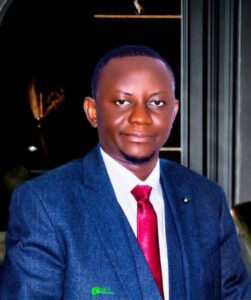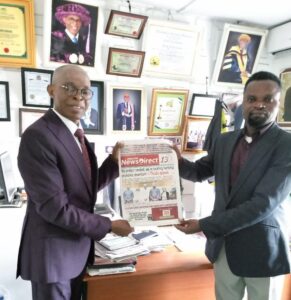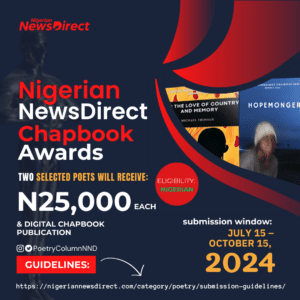
I am always writing towards hope — Christtie Jay
First runner-up, 2022 LIPFEST’s Poetry Slam, Christtie Jay in this conversation with Flourish Joshua discusses her forthcoming spoken word album, motivations, writing process, and what lies ahead.
Why poetry?
Because poetry is music. It’s soul food. It’s fluidity and freedom. It is romance and attentiveness. A bridge and a door. Comfort and hell, simultaneously. Dance and infinite possibilities. It is the heart in our ribs and the blood in our veins. It is life jacket and a raft. Poetry. Because beyond storytelling, poetry transforms.
In 2022, you came 2nd in LIPFEST’s Poetry Slam. How was the journey, and how did it feel emerging 2nd?
To be honest, arriving 2nd place didn’t feel like anything for a really long time. I didn’t win so I didn’t feel the need to celebrate nor did I feel like I was a good enough writer/performer. Something must be wrong, I thought. Not until a few friends reminded me that that was my second slam ever, and oh well, awards are not the only proof of talent. Speaking of talent, did you see the talents I was competing with? On a stage with hundreds of crowds that I only knew three people personally and so wasn’t sure anyone would cheer or like it? It took a while, but I really am grateful for the experience and proud of myself for the courage to try.
With regards the journey, it started years ago. 2019 precisely, when new in Lagos, I was always attending open mics. There I honed the skills and courage to perform. BUT even at that, the entire experience was extremely scary. I remember a few days to the shortlist announcement, I was contacted by the team that the video I sent in wasn’t playing, and so in the interest of fairness they gave me a chance to submit again. I remember thinking they’ve seen everyone’s video, you’re out now. Then the list was announced, and I made it. And everything that could have gone wrong started going wrong. From my health to flight postponement, to having a wardrobe malfunction at the event and others. But oh well… we made it.
What do you intend to do with spoken word poetry?
For me, it’s more of what spoken word has done for me. I fell in love with page poetry first, you know, so I only started attending open mics in 2019 to watch other poets perform. I was so shy then I never imagined ever getting on a stage, small or big. However, as I watched other poets, I became engrossed with the power of the tongue to lift and give life. To clarify, I wanted to partake in dispatching such beauty. The seductiveness of body, face and voice working in harmony — the spell.
As a Yoruba girl, I have always been warned to be careful with all I say, even jokingly because saying makes it a reality in waiting. However, I didn’t really understand why until I started engaging with spoken word. While page poetry leaves the reader to make of it what you will, spoken word directly sends a summon into the audience. That’s what I like about it. That’s what I hope to do more with it. To use performance to dish out community summons. To say, look, this has happened, or this is happening, what do we do? What do we learn or unlearn? How do we move forward, as a community?
Who are some of your favourite poets and writers? Who are poets whose work you turn to in times of disquiet? What is it about their work that speaks to you, that shapes you?
Ohhh the list is really really really really long. I think I enjoy different poets for different reasons, and seasons. For spoken word — I especially love poets like Alyssa Harris, Modise Sekgotho, Jasmine Mans, Wana Udobang, Nkateko Masinga, Mufasa the Poet, and Vuyelwa Malukeke. With page poetry, I love Pamilerin Jacob, Omotara James, Koleka Putuma, Adedayo Agarau, Kevin G. Kelly, Rumi, Busisiwe Mahlangu, Maggi Smith, Rita Dive, Danez Smith, and thousands more.
When in need of grounding, I often turn to the works of Franz Wright, Elizabeth Jennings, Odia Ofeimun, Rumi, among others. I think for me it is the evident display of humanity in their work. They all have a unique way of capturing human emotion and experience, and their words have a timeless quality that resonates with readers across generations.
What are you writing towards? What factors inform your work?
I think I am always writing towards hope, regardless of whatever the main subject is. I approach a poem curious. It is not that I always want to write, but that I have an itch, questions, a joy I want to cage forever, or an observation, or community loss to document — just so it doesn’t just disappear quietly into history — because I fear not documenting is how we repeat history. How we call forth our tragedies again. And so, many of my poems are informed by my interaction with the world and people.
You often explore love, gender equality, queerness, politics in your poems. We’d like to know a bit about your writing process.
A poem for me begins with immense consumption. A trip, sometimes into my immediate environment, sometimes a movie, a music, a book, the past, future. The sitting still and quietly drinking, what the story is, what I missed, what it could be. I have learnt that there’s always a canvas, waiting to be touched, but first you have to take the trip. After, once the initial idea has taken shape, I dive deeper into the theme by reading poems written by other poets on the same topic. This research allows me to gain new insights, discover different perspectives, and find ways to tighten my own writing. Depending on whether I decide to keep the poem or not, I send to friends, and together we tear, rearrange and rebuild it until it feels like a thing.
What would you like readers outside your country to know about living, loving, working, and creating in Nigeria?
Well, I think the living, and loving is not so different from what is found in many parts of the world. Nigerians are generally a very loving people. But as is common with a country, sometimes our country fails us, and sometimes we fail her. With regards working and creating, I think there’s room for more growth and structural support for artists (in particular those in the literary space) working on the continent. So when you find artists creating despite the circumstance, please support them. Truly. I hold people who do the work in reverence. Especially knowing what I know now. There’s a lot of begging, community work, and sacrifices for many of these works to exist.
What’s next on the horizon for you — personally, poetically, professionally?
Personally, rest. Poetically and professionally — I have finished working on my first poetry album for some time now, and I look forward to releasing it and having my second headline show. I am also working on a collection of poems after news reports I’ve been waking up to. There’s also the issue of an MFA. Some of my applications have returned favourably and I am excited about the possibility of that, of engaging, writing and reading poetry inspired not just by reading but by rigorous thinking informed by knowledge external.



